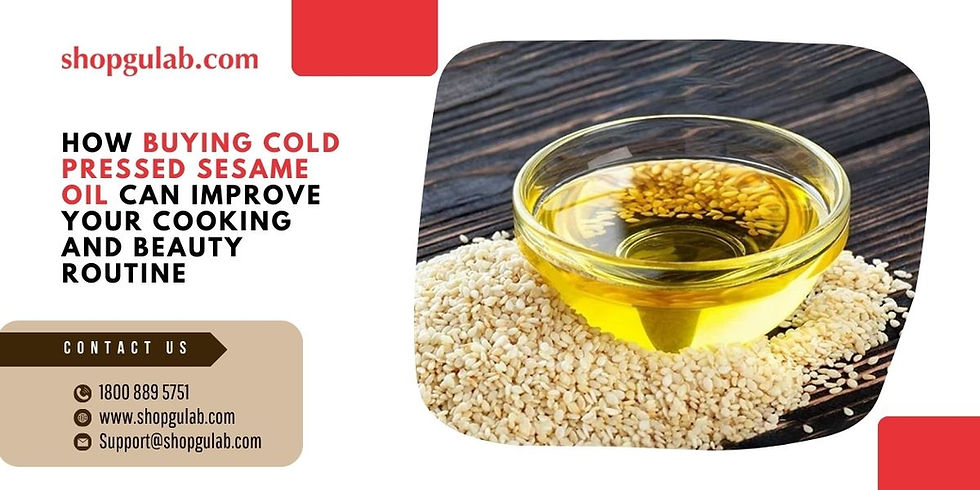What is Cold-Pressed Mustard Oil: Types, Benefits & Uses?
- Oct 10, 2023
- 3 min read
Cold-pressed mustard oil is a type of cooking oil that is extracted from mustard seeds using a mechanical process called cold pressing. This method involves crushing the mustard seeds without the use of heat or chemicals, which helps retain the natural flavor, aroma, and nutritional properties of the oil. Here's a breakdown of cold-pressed mustard oil, including its types, benefits, and uses:
Types of Mustard Oil:
Yellow Mustard Oil: This is the most commonly used variety of mustard oil and is extracted from yellow mustard seeds. It has a mild and slightly tangy flavor, making it suitable for a wide range of culinary applications.
Brown Mustard Oil: Extracted from brown mustard seeds, this oil has a stronger and spicier flavor compared to yellow mustard oil. It is often used in dishes that require a more pungent taste.

Benefits of Cold-Pressed Mustard Oil:
Rich in Healthy Fats: Mustard oil is high in monounsaturated and polyunsaturated fats, which are considered heart-healthy fats. It can help lower bad cholesterol levels when used in moderation.
Antioxidant Properties: Mustard oil contains antioxidants like vitamin E and selenium, which can help protect cells from oxidative stress and reduce the risk of chronic diseases.
Anti-Inflammatory: The oil contains compounds like allyl isothiocyanate, which have anti-inflammatory properties and may help alleviate symptoms of conditions like arthritis.
Hair Care: Mustard oil is often used for hair care due to its potential to promote hair growth, strengthen hair, and reduce dandruff. It is also a common ingredient in herbal hair oils.
Skin Health: Some people use mustard oil for massage and as a skin moisturizer. It can help improve blood circulation and keep the skin hydrated.
Uses of Cold-Pressed Mustard Oil:
Cooking: Mustard oil is commonly used in Indian, Bengali, and some Mediterranean cuisines for frying, sautéing, and tempering. It imparts a unique flavor to dishes.
Marinades: It is often used as a base for marinades for meats, fish, and vegetables due to its strong flavor and ability to tenderize proteins.
Pickling: Mustard oil is a popular choice for pickling various vegetables and fruits, as its pungent taste complements the preserved items.
Massage: In some cultures, mustard oil is used for body massage, especially in traditional Ayurvedic practices, to alleviate muscle pain and improve skin health.
Hair Care: Applied to the scalp and hair, mustard oil can help nourish the hair, improve its texture, and promote growth.
External Remedies: Mustard oil can be used externally to relieve minor aches and pains, such as joint pain or muscle soreness when massaged onto the affected area.
While cold-pressed mustard oil offers several potential health benefits, it's essential to use it in moderation, as excessive consumption may have adverse effects. Always consult with a healthcare professional before making significant dietary changes, especially if you have specific health concerns or conditions.

In conclusion, cold-pressed mustard oil is a versatile and beneficial cooking oil derived from mustard seeds through a gentle extraction process. Its two primary varieties, yellow and brown, offer distinct flavors for culinary exploration. This oil's numerous advantages include its richness in heart-healthy fats, antioxidant properties, and potential anti-inflammatory effects. Additionally, it finds applications in hair care, skin care, and traditional remedies.
While integrating cold-pressed mustard oil into your diet and wellness routine can provide health benefits, moderation is key. Excessive consumption should be avoided, and it's advisable to consult with a healthcare professional before making any significant dietary changes, especially if you have specific health concerns or medical conditions. Embracing the flavors and benefits of cold-pressed mustard oil in your cooking and self-care practices can be a delightful and nutritious addition to your lifestyle.
To learn more information about our products contact us now!!!








Comments